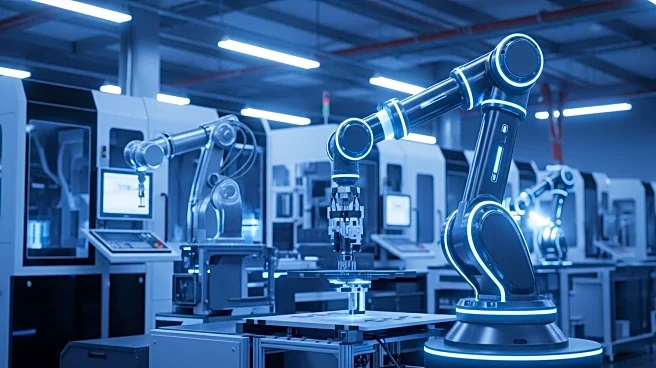What is the story about?
What's Happening?
The manufacturing industry is increasingly adopting a startup approach to attract Gen Z workers, as discussed in a recent episode of the 'Gen Z in Manufacturing' podcast. Marco Ristano, a senior industrial engineering and planning specialist at Caracol, shared insights on how large companies are using startup models to appeal to younger employees. Ristano, who joined Caracol through a recommendation from the investment sector, has been with the company for nearly four years. His role involves data collection, analysis, and digitalization, as well as managing internal information flows. He aspires to move into a strategic role that involves high-level decision-making. The podcast episode highlighted the importance of feeling valued at work for Gen Z and their preference for the dynamic and innovative culture typical of startups. It also discussed how companies can maintain a startup identity as they grow.
Why It's Important?
This shift towards a startup culture in manufacturing is significant as it addresses the evolving expectations of the workforce, particularly Gen Z. This generation values meaningful work experiences and a sense of belonging, which traditional manufacturing roles may not always provide. By adopting a startup approach, manufacturing companies can offer a more engaging and flexible work environment, potentially increasing job satisfaction and retention among younger employees. This cultural shift could lead to a more innovative and adaptive manufacturing sector, better equipped to meet the challenges of a rapidly changing global market. Companies that successfully integrate these elements may gain a competitive edge in attracting and retaining top talent from the Gen Z demographic.
What's Next?
As more manufacturing companies adopt startup models, it is likely that we will see a broader transformation in the industry’s work culture. Companies may invest in training programs that emphasize innovation and flexibility, aligning with Gen Z’s values. Additionally, there could be an increase in collaborative projects and cross-functional teams, fostering a more inclusive and dynamic work environment. Industry leaders might also explore partnerships with educational institutions to create pathways for young talent to enter the manufacturing sector. These changes could lead to a more diverse and skilled workforce, driving the industry forward.
Beyond the Headlines
The adoption of a startup culture in manufacturing could have long-term implications for the industry’s image and appeal. By breaking away from traditional hierarchical structures, companies may foster a more inclusive and diverse workplace. This cultural shift could also influence the industry’s approach to innovation, encouraging a more agile and responsive business model. Furthermore, as companies embrace digitalization and data-driven decision-making, there may be increased opportunities for technological advancements and process improvements. These developments could position the manufacturing sector as a leader in innovation and sustainability.
















